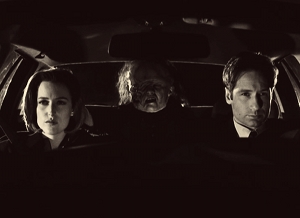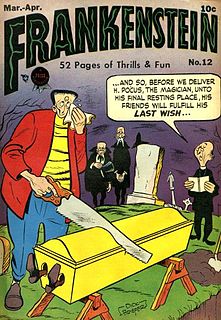Related Research Articles

John William Polidori was an English writer and physician. He is known for his associations with the Romantic movement and credited by some as the creator of the vampire genre of fantasy fiction. His most successful work was the short story "The Vampyre" (1819), the first published modern vampire story. Although the story was at first erroneously accredited to Lord Byron, both Byron and Polidori affirmed that the story is Polidori's.

Frankenstein's monster or Frankenstein's creature, often erroneously referred to as simply "Frankenstein", is a fictional character who first appeared in Mary Shelley's 1818 novel Frankenstein; or, The Modern Prometheus. Shelley's title thus compares the monster's creator, Victor Frankenstein, to the mythological character Prometheus, who fashioned humans out of clay and gave them fire.

Johann Konrad Dippel, also spelled Johann Conrad Dippel, was a German Pietist theologian, physician, alchemist and occultist.

Mary Shelley's Frankenstein is a 1994 science fiction horror film directed by Kenneth Branagh, and starring Robert De Niro, Kenneth Branagh, Tom Hulce, Helena Bonham Carter, Ian Holm, John Cleese, and Aidan Quinn. The film was produced on a budget of $45 million and is considered the most faithful film adaptation of Mary Shelley's 1818 novel Frankenstein; or, The Modern Prometheus, despite several differences and additions in plot from the novel.

"The Vampyre" is a short work of prose fiction written in 1819 by John William Polidori taken from the story Lord Byron told as part of a contest among Polidori, Mary Shelley, Lord Byron, and Percy Shelley. The same contest produced the novel Frankenstein; or, The Modern Prometheus. The Vampyre is often viewed as the progenitor of the romantic vampire genre of fantasy fiction. The work is described by Christopher Frayling as "the first story successfully to fuse the disparate elements of vampirism into a coherent literary genre."

Patchwork Girl is a work of electronic literature by American author Shelley Jackson. It was written in Storyspace and published by Eastgate Systems in 1995. It is often discussed along with Michael Joyce's afternoon, a story as an important work of hypertext fiction.

Mary Shelley's 1818 novel Frankenstein; or, The Modern Prometheus, and the famous character of Frankenstein's monster, have influenced popular culture for at least a century. The work has inspired numerous films, television programs, video games and derivative works. The character of the monster remains one of the most recognized icons in horror fiction.

"The Post-Modern Prometheus" is the fifth episode of the fifth season of the American science fiction television series The X-Files and originally aired on the Fox network on November 30, 1997. Written and directed by series creator Chris Carter, "The Post-Modern Prometheus" is a "Monster-of-the-Week" episode, a stand-alone plot which is unconnected to the overarching mythology of The X-Files. "The Post-Modern Prometheus" earned a Nielsen household rating of 11.5, being watched by 18.68 million viewers upon its initial broadcast. The episode was nominated for seven awards at the 1998 Emmys and won one. The entry generally received positive reviews; some reviewers called it a classic, with others calling it the most striking stand-alone episode of the show's fifth season.
The German name Frankenstein most commonly refers to various aspects of a 19th-century novel written by Mary Shelley, but was originally a place name.

Frankenstein; or, The Modern Prometheus is an 1818 novel written by English author Mary Shelley. Frankenstein tells the story of Victor Frankenstein, a young scientist who creates a sapient creature in an unorthodox scientific experiment. Shelley started writing the story when she was 18, and the first edition was published anonymously in London on 1 January 1818, when she was 20. Her name first appeared in the second edition, which was published in Paris in 1821.

There have been many comic book adaptations of the monster story created by Mary Shelley in her 1818 novel Frankenstein. Writer-artist Dick Briefer presented two loose adaptations of the story in publisher Prize Comics' successive series Prize Comics and Frankenstein from 1940 to 1954. The first version represents what comics historians call American comic books' first ongoing horror feature.

History of a Six Weeks' Tour through a part of France, Switzerland, Germany, and Holland; with Letters Descriptive of a Sail Round the Lake of Geneva and of the Glaciers of Chamouni is a travel narrative by the English Romantic authors Mary Shelley and Percy Bysshe Shelley. Published anonymously in 1817, it describes two trips taken by Mary, Percy, and Mary's stepsister, Claire Clairmont: one across Europe in 1814, and one to Lake Geneva in 1816. Divided into three sections, the text consists of a journal, four letters, and Percy Shelley's poem "Mont Blanc". Apart from the poem, preface, and two letters, the text was primarily written and organised by Mary Shelley. In 1840 she revised the journal and the letters, republishing them in a collection of Percy Shelley's writings.

St. Irvyne; or, The Rosicrucian: A Romance is a Gothic horror novel written by Percy Bysshe Shelley in 1810 and published by John Joseph Stockdale in December of that year, dated 1811, in London anonymously as "by a Gentleman of the University of Oxford" while the author was an undergraduate. The main character is Wolfstein, a solitary wanderer, who encounters Ginotti, an alchemist of the Rosicrucian or Rose Cross Order who seeks to impart the secret of immortality. The book was reprinted in 1822 by Stockdale and in 1840 in The Romancist and the Novelist's Library: The Best Works of the Best Authors, Vol. III, edited by William Hazlitt. The novella was a follow-up to Shelley's first prose work, Zastrozzi, published earlier in 1810. St. Irvyne was republished in 1986 by Oxford University Press as part of the World's Classics series along with Zastrozzi and in 2002 by Broadview Press.

Monster literature is a genre of literature that combines good and evil and intends to evoke a sensation of horror and terror in its readers by presenting the evil side in the form of a monster.

Mary Wollstonecraft Shelley was an English novelist who wrote the Gothic novel Frankenstein; or, The Modern Prometheus (1818), which is considered an early example of science fiction. She also edited and promoted the works of her husband, the Romantic poet and philosopher Percy Bysshe Shelley. Her father was the political philosopher William Godwin and her mother was the philosopher and feminist activist Mary Wollstonecraft.

Victor Frankenstein is a 2015 American science fantasy drama horror film based on contemporary adaptations of Mary Shelley's 1818 novel Frankenstein; or, The Modern Prometheus. It is directed by Paul McGuigan and written by Max Landis, and stars James McAvoy as Victor Frankenstein and Daniel Radcliffe as Igor. The film was released by 20th Century Fox on November 25, 2015.

The Frankenstein authorship question refers to the historical uncertainty that exists around Percy Bysshe Shelley's contributions to Frankenstein; or, The Modern Prometheus, a novel attributed to Shelley's wife, Mary Shelley.

"On Frankenstein" is a review of the 1818 novel Frankenstein; or, The Modern Prometheus written by Percy Bysshe Shelley in 1817 but not published until 1832.

The Strange Case of the Alchemist's Daughter is a 2017 novel by Theodora Goss. It is her debut novel, though she is an award-winning author of many short works. Strange Case is the first installment of The Extraordinary Adventures of the Athena Club series, and is followed by European Travel for the Monstrous Gentlewoman. The story follows Mary Jekyll, daughter of the literary character Dr. Jekyll, as she meets and connects with the fictional daughters of major literary characters, and works with and faces various famous 19th century literary personae, including Sherlock Holmes and Dr. Watson, Frankenstein's monster, and others to solve the mystery of a series of killings in London, as well as the mystery of her own family story. Drawing on classic gothic and horror creations of the 19th century, such as The Strange Case of Dr. Jekyll & Mr. Hyde, Frankenstein, Rappaccini’s Daughter, The Island of Doctor Moreau, Dracula and the Sherlock Holmes stories, Goss reimagines the works of such literary greats as Mary Shelley, Robert Louis Stevenson, H. G. Wells, Bram Stoker and Nathaniel Hawthorne from a feminist perspective, as well as the historical record of the Jack the Ripper murders. At the center of the narrative is the connection and various experiences of the women who form the Athena Club, the oppressions they experience, and how they empower each other to accomplish great things.
References
- Paddon, Seija: A review of the novel Frankensteinin muistikirja, World Literature Today, Autumn 1997 issue.
- Paddon, Seija: Juha K. Tapio's Frankenstein's Notebook and Mary Wollstonecraft Shelley's Frankenstein or, The Modern Prometheus: Whose Monster is he, anyway? Scandinavian-Canadian Studies, Volume 10, 1997, p. 23-33.
- The monster reveal'd. Extracts from the novel Frankensteinin muistikirja. Translated by Anselm Hollo. Books from Finland 1/1997.